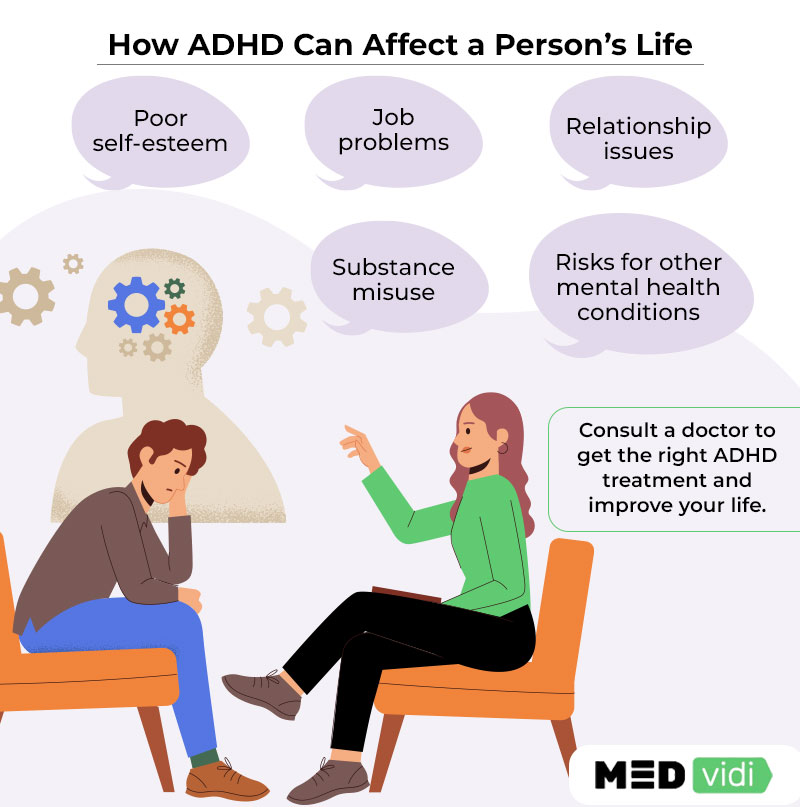Attention deficit hyperactivity disorder (ADHD) is a childhood disorder but it can last into adulthood if untreated. Even after the diagnosis, people often underestimate the importance of managing symptoms. Moreover, sometimes, they may not know their challenges in daily life are caused by a mental health condition. So, before going into the long-term effects of untreated ADHD in adults, let’s learn more about its key symptoms.
Symptoms of ADHD in Adults
ADHD symptoms are divided into two categories, being associated with either inattention or hyperactivity. In adults, inattention is more common because the signs of
- Difficulty focusing
- Impulsiveness
- Restlessness
- Poor time management
- Forgetfulness
- Emotional instability
- Hyperfocus
- Lack of motivation
- Disorganization
- Trouble in social connections
Sometimes, these symptoms are considered to be the signs of immaturity, which increases the stigma around ADHD. Also, they may be mistaken for other mental health conditions, such as depression or anxiety disorders. That is why it’s important to consult an experienced healthcare provider to receive an accurate diagnosis and appropriate treatment. Before an appointment, you can take our free online ADHD test to get an initial insight into your symptoms.
Is ADHD in Women and Men Different?
ADHD can affect both men and women, but there are differences in how it manifests and is diagnosed between the two genders. Here are some main differences:
- Disparities in diagnosis: Females are
less likely to receive an ADHD diagnosis[2] . This may be because males frequently exhibit more hyperactive and impulsive behavior, which are more pronounced, compared to females’ more frequently occurring inattentive symptoms, which can be less noticeable. - Presentation: Males with ADHD frequently exhibit
externalizing behaviors[3] , including impulsivity and hyperactivity, which can result in disruptive behavior. In females with ADHD, internalizing behaviors are more prevalent, such as forgetfulness, disorganization, and inattentiveness. - Comorbid conditions: Males with ADHD are prone to possess a history of
conduct disorder[4] or oppositional defiant disorder as comorbid conditions. Females with ADHD tend to have co-occurring mood disorders likedepression and anxiety[5] .
Long-term Effects of Untreated ADHD in Adults
The effects of ADHD, if not treated, can go beyond inattentiveness and impulsivity and impact others too. A few potential consequences of untreated ADHD are explained below.
Relationship Issues
Young adults with ADHD have
For instance, a person with ADHD can drop off during conversations, leaving their significant others feeling unheard and undervalued. On the other hand, they can carelessly agree to something they later regret or neglect essential things, which can frustrate their loved ones and strain relationships.

Poor Self-Esteem
Self-esteem issues are also
Job Problems
It may be more difficult for someone with ADHD to tackle projects that require routine actions, adherence to deadlines, strict instructions, and close interaction with coworkers. People with ADHD may discover that they are not as focused, motivated, or productive as they would like to be at work.
Poor Financial Management
People with ADHD tend to have
Substance Abuse
Adults with severe ADHD who leave it untreated are more likely to develop substance abuse disorder because they may self-medicate to ease their symptoms. Treatment for both addiction and ADHD can be challenging because certain ADHD medications have increased risks for habit forming. For example, central nervous system stimulants Ritalin and Adderall are frequently successful in treating ADHD symptoms but also have
Increased Risk of Injuries and Accidents
According to several studies, adults having ADHD are at higher risk of having accidents. The disorder may increase the tendency for risky behaviors and impulsiveness, which also can play a role in injuries and undesirable events. In addition, the Vall d’Hebron Research Institute report has revealed that 19 genetic regions are associated with both ADHD and lower life expectancy. The study emphasizes the need for early diagnosis and intervention to address potential risks, including impulsive behaviors and unhealthy habits.
Physical Health Problems
Untreated ADHD in adults can make it challenging to keep up with regular healthcare routines. They might neglect preventive healthcare measures or miss appointments or prescriptions. They also have a higher risk of engaging in unhealthy living practices such as eating poorly, exercising not often, and getting too little sleep. These choices may exacerbate physical health conditions such as obesity, heart disease, and associated difficulties.
Higher cortisol levels
The Link Between Untreated ADHD and Other Mental Health Conditions
ADHD is frequently comorbid with learning disabilities and mental conditions. It is estimated that about
Can Untreated ADHD Cause Anxiety?
For some individuals with ADHD, worry and anxiety are a source of mental focus, similar to how physical pain captures attention. This search for something to worry about can be a double-edged sword: it keeps their mind engaged, but at the same time, it may lead to anxiety disorders. However, the reasons for the co-occurrence of ADHD and anxiety can be different. For example, worrying can result from frequent
Can Untreated ADHD Cause Depression?
Untreated ADHD often results in ongoing frustration and disappointment, which can lead to depression. According to different studies, this comorbidity takes place in
Difficulties at work, relationships, and daily tasks can amplify negative emotions, fostering low self-esteem and a pessimistic self-image.
Why Can ADHD Be Left Untreated?
Adults with ADHD may not take steps to manage the condition for many reasons. First, they may be unaware of having ADHD or underestimate its impact on their day-to-day life. Second, the societal stigma surrounding mental health issues and shame-related fears can discourage them from seeking treatment. In addition, individuals may be afraid of the potential side effects of ADHD medications. However, an open discussion with a healthcare provider and patience while determining the right treatment can decrease the chances of adverse reactions.
Some people with ADHD may also see specific symptoms as “benefits.” For example, they may want to save hyperfocus on interesting tasks, periods of high energy and enthusiasm, and spontaneity as a means to be more open to new experiences. Nevertheless, it’s important to remember that ADHD is a disorder, and even though it can bring extra creativity, it can also bring serious disadvantages, such as co-occurring conditions and negative effects on different areas of life.
Treating ADHD in Adults
Treatment for adult ADHD usually involves a comprehensive strategy. It may include medications (stimulants or non-stimulants), psychotherapy, and lifestyle changes. By affecting brain chemicals, medication can help improve focus, control impulsivity, and enhance cognitive functions. On the other hand, talk therapy aids in maintaining the achieved results of treatment.
Another element of managing adult ADHD is the modification of lifestyle. With the help of a mental health professional, patients can learn methods for stress reduction, incorporate a healthier diet, engage in consistent exercise, and improve their sleep schedule. In addition, establishing an accepting network of family and friends or attending support groups can be beneficial in overcoming the difficulties associated with attention deficit hyperactivity disorder.
In Conclusion
ADHD is not completely curable, but it is manageable. Living with untreated ADHD can lead to low self-esteem, substance abuse, increased risk of accidents, and financial or legal difficulties. On the contrary, different treatment approaches, including non-pharmacological ones, can help cope with ADHD symptoms and improve overall well-being. Book an appointment today to learn more about the treatment options that can work best for you.
Frequently Asked Questions
What are the causes of ADHD?
There is no one exact cause that contributes to the development of attention deficit hyperactivity disorder. It is a combination of neurological, genetic, and environmental factors that vary from one person to another.
Do I have undiagnosed ADHD?
If you think you might have ADHD, consider consulting a healthcare provider. They will assess your symptoms, medical history, and specific behaviors that affect your daily life to make a diagnosis. Moreover, this disorder typically develops in childhood, so if you had any symptoms as a kid, there are increased chances of having adult ADHD.
Does ADHD get worse with age?
Generally, age doesn’t affect ADHD, and adults can even deal with its symptoms better by developing coping strategies. However, there might be a change in the way the condition manifests itself. For example, hyperactivity often appears during childhood ADHD, while adults have signs of inattention more frequently, and ADHD becomes more noticeable. Also, note that untreated ADHD can get worse, so it’s usually recommended to see a psychologist or a medical professional to choose appropriate methods to manage it.
Is ADHD dangerous?
While adult ADHD is not naturally harmful, it can cause difficulties in different spheres of life. A person may have problems at work, strained relationships, and co-occurring mental health problems. Untreated ADHD in adults also causes a higher risk of accidents, so it’s recommended to consult a healthcare professional who can diagnose ADHD and suggest proper treatment.
What does untreated ADHD in adults look like?
If ADHD goes untreated, it can lead to increased distractibility, difficulty paying attention, recurrent feelings of frustration, and time blindness. An adult with ADHD may also have mood swings, problems with planning and organization, and restlessness. Specific symptoms may vary from one person to another, so consider seeing a healthcare professional to get assessed for ADHD.













